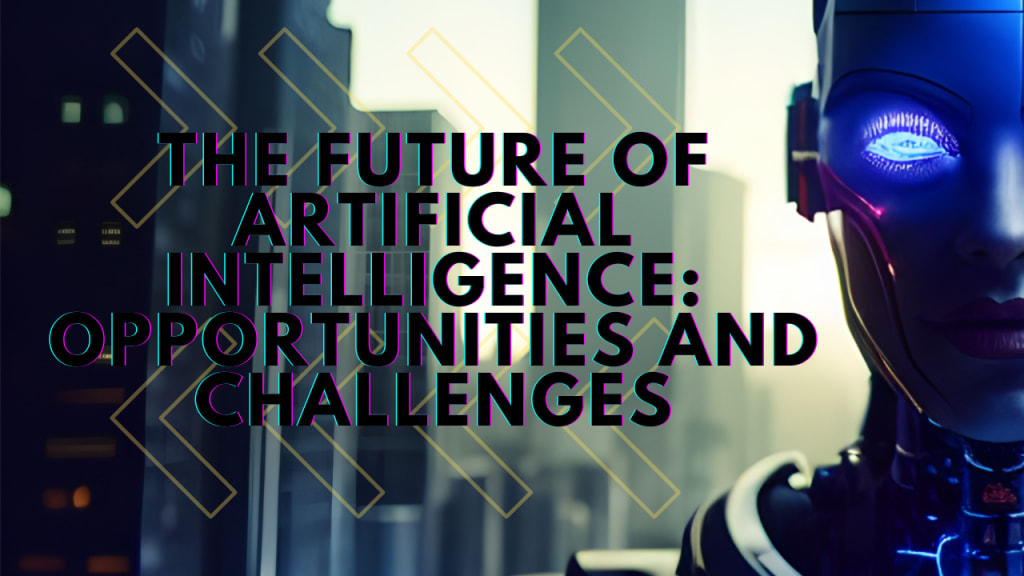
Artificial intelligence (AI) is a rapidly advancing technology that has the potential to transform many aspects of our lives. From healthcare to transportation, AI is already being used to solve complex problems and improve efficiency. However, as with any technology, there are both opportunities and challenges associated with the future of AI. In this article, we'll explore the opportunities and challenges of AI and what the future of this technology may hold.
Opportunities of AI
AI has the potential to create many opportunities for individuals and organizations across a wide range of industries. Here are a few potential opportunities of AI:
- Improved Efficiency
One of the main benefits of AI is that it can improve efficiency by automating repetitive tasks and processes. This can free up time for individuals to focus on more complex and creative work, and can help organizations to reduce costs and increase productivity.
- Enhanced Personalization
AI can also be used to create personalized experiences for individuals. For example, AI algorithms can analyze data about a user's behavior and preferences to provide personalized recommendations for products or services. This can improve customer satisfaction and help organizations to build stronger relationships with their customers.
- Improved Healthcare
AI has the potential to revolutionize healthcare by improving diagnosis, treatment, and patient outcomes. For example, AI algorithms can analyze medical images to identify potential health issues, and can help doctors to develop personalized treatment plans for patients based on their individual characteristics.
Challenges of AI
While there are many potential opportunities associated with AI, there are also a number of challenges that need to be addressed. Here are a few potential challenges of AI:
- Job Displacement
One of the main challenges of AI is the potential for job displacement. As AI algorithms become more advanced, they may be able to perform tasks that were previously done by humans. This could lead to job loss in certain industries, particularly those that rely on repetitive or routine tasks.
- Bias and Discrimination
Another challenge of AI is the potential for bias and discrimination. AI algorithms can be biased if they are trained on data that is biased or incomplete. This can result in unfair outcomes for certain groups of individuals, such as those who belong to minority groups or have certain characteristics.
- Lack of Transparency
AI algorithms can be complex and difficult to understand, which can make it challenging to identify and address potential issues. This lack of transparency can make it difficult to hold organizations accountable for the decisions made by their AI algorithms.
The Future of AI
The future of AI is likely to be shaped by ongoing technological advancements, as well as social and political developments. Here are a few potential trends that may shape the future of AI:
- Continued Advancements in AI Technology
AI technology is likely to continue to advance rapidly in the coming years. This could lead to new and exciting applications of AI in a wide range of industries, as well as new challenges that need to be addressed.
- Increased Focus on Ethical and Social Implications
As AI technology becomes more prevalent in society, there is likely to be increased focus on the ethical and social implications of this technology. This could lead to new regulations and guidelines for the development and use of AI, as well as increased public awareness and engagement with the topic.
- Greater Collaboration and Partnership
As the challenges of AI become more complex and multifaceted, there is likely to be greater collaboration and partnership between individuals and organizations across a wide range of industries. This could help to create more holistic and effective solutions to the challenges of AI.
Conclusion
AI is a rapidly advancing technology that has the potential to transform many aspects of our lives. While there are many potential opportunities associated with AI, there are also a number of challenges that need to be addressed. By focusing on the ethical and social implications of AI, and working collaboratively to address these challenges, we can help to ensure that the future of AI is one that benefits individuals and society as a whole.